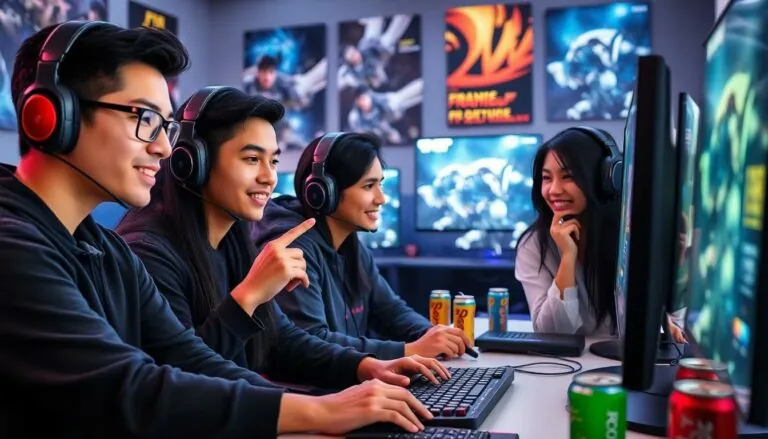Table of Contents
ToggleIn the fast-paced world of Rocket League esports, teams zoom across the arena like turbo-charged cars on a sugar high. With a blend of skill, strategy, and a dash of chaos, these teams are not just playing a game; they’re redefining what it means to be a sports team in the digital age. Who knew that flipping cars could lead to such thrilling competition and jaw-dropping moments?
As fans cheer from the sidelines and players execute mind-boggling aerials, it’s clear that Rocket League isn’t just a hobby; it’s a global phenomenon. Each team brings its own flair, from the underdogs to the seasoned pros, proving that in this league, anything can happen. Buckle up as we dive into the world of Rocket League esports teams, where every goal is a potential highlight reel and every match could be the one that goes down in history.
Overview of Rocket League Esports Teams
Rocket League esports teams have transformed the competitive landscape of the game. They range from amateur squads to professional powerhouses, each contributing to the game’s growth and popularity. Highly skilled players compete in various leagues and tournaments, showcasing their talent on global platforms.
Diverse teams, such as Team BDS, G2 Esports, and FaZe Clan, exemplify excellence in gameplay. Established organizations invest in player development and training facilities. Newer teams often bring fresh talent, creating an exciting dynamic within the community.
Sponsorships play a crucial role in supporting these teams. Major brands align with organizations to enhance visibility and engagement. Players often participate in content creation to reach broader audiences and elevate their teams’ profiles.
Regional competitions further highlight the diversity of Rocket League teams. North America and Europe host some of the most competitive leagues, yet emerging regions like Oceania and South America are gaining recognition. Tournaments like the Rocket League Championship Series (RLCS) feature top teams battling for prestigious titles and significant prize pools.
Statistical analysis reveals player performance and team strategies. Metrics such as goals scored, assists, and saves are vital for evaluating a team’s success. Understanding these statistics enhances development and prepares teams for high-stakes matches.
Community support remains a backbone for Rocket League esports. Fans rally for their favorite teams, creating a vibrant atmosphere during tournaments. This interaction between teams and supporters fosters loyalty and drives further growth within the Rocket League ecosystem.
Major Rocket League Esports Teams
Rocket League esports teams demonstrate exceptional skill and strategy, contributing to the game’s meteoric rise. Several teams stand out for their competitive prowess and unique backgrounds.
Team Names and Backgrounds
Team BDS emerged from Switzerland and quickly established itself in the top tier of Rocket League. G2 Esports, an organization based in the United States, is known for its strategic gameplay and dynamic roster. FaZe Clan, another well-known name, embraces a broad approach to gaming, blending traditional esports with lifestyle branding. NRG Esports, recognized as a formidable contender, showcases American talent with a history of strong performances. Each of these teams maintains a dedicated fan base and represents a unique segment of the esports community, focusing on talent development and community engagement.
Recent Achievements
Team BDS recently clinched the championship title at the RLCS World Championship, solidifying their position in the esports hierarchy. G2 Esports made headlines by securing victories in multiple tournaments, showcasing their adaptability and prowess. FaZe Clan reached the semi-finals in several major competitions, proving their consistency on the big stage. NRG Esports finished in the top three during the latest RLCS season, reflecting their ongoing commitment to excellence. Each team’s success contributes to the growing prestige of Rocket League esports, captivating fans and attracting sponsors alike.
Rising Stars in Rocket League Esports
The landscape of Rocket League esports continually evolves, introducing new talent and teams. Emerging organizations are making significant strides in competitive play, showcasing remarkable skill.
Promising New Teams
Several squads demonstrate potential and ambition. Team Secret stands out with a strong showing in regional tournaments, earning a reputation for their dynamic play. Another noteworthy team, Oceanic Esports, has consistently improved, successfully competing against established names. Additionally, Endpoint has generated buzz in Europe, impressing fans with their strategic gameplay. These teams focus on player development, creating a foundation for future successes in the Rocket League ecosystem.
Player Highlights
Notable players are emerging from these teams, showcasing exceptional talent. Jstn from NRG Esports remains a crowd favorite, known for his aerial precision and clever maneuvers. Meanwhile, Axel from Team Secret exhibits remarkable teamwork and communication skills, enhancing his team’s competitive edge. Another player, Maestro from Endpoint, has captivated audiences with his innovative plays. Collectively, these players contribute to their teams’ successes while attracting attention from fans and sponsors alike.
Community and Fan Engagement
Rocket League esports thrives on robust community and fan interactions. Engaging with fans drives the popularity and growth of the sport.
Social Media Impact
Social media influences Rocket League esports teams significantly. Platforms like Twitter, Instagram, and Twitch serve as vital channels for teams to connect with fans. Teams regularly share highlights, behind-the-scenes content, and player insights. Engaging livestreams foster real-time connections, allowing fans to interact with players directly. This dynamic interaction enhances fan loyalty and broadens reach, attracting new viewers. As fans share content, they promote their favorite teams, amplifying visibility. Successful engagement strategies benefit both teams and sponsors, creating a win-win situation in the competitive landscape.
Fan Events and Tournaments
Fan events cultivate community spirit within Rocket League esports. Major tournaments, including the RLCS, draw enthusiastic crowds both online and offline. Fans frequently gather in arenas to support their teams during matches, creating an electric atmosphere. These gatherings provide opportunities for fans to meet players, participate in activities, and witness live gameplay. Local events also enhance regional team followings, attracting fans from diverse backgrounds. The excitement surrounding these tournaments strengthens connections between players and fans, building loyalty for each organization. Enhanced fan experiences create lasting memories and foster deeper investment in the esports community.
Challenges Faced by Rocket League Esports Teams
Rocket League esports teams encounter various challenges that shape their competitive journeys. These challenges can significantly impact their performance and sustainability in the fast-paced esports environment.
Competitive Landscape
Competition among Rocket League teams intensifies as new organizations consistently emerge. Teams like Team BDS and G2 Esports face pressure from rising squads, including Team Secret and Endpoint. Constantly evolving strategies and meticulous gameplay are essential for success. Many teams find themselves balancing short-term performance with long-term growth and viability. Assessing player performance using statistics can be critical, yet metrics don’t always capture the finesse of individual skill and teamwork. Navigating such a crowded field requires teams to innovate and adapt rapidly.
Financial Aspects
Financial hurdles present considerable challenges for Rocket League esports teams. Sponsorship deals provide essential funding, yet securing these partnerships often proves difficult. Teams reliant on consistent brand engagement must showcase their value to potential sponsors. Prize pools generated by tournaments play a crucial role, but these funds can fluctuate dramatically based on team performance and tournament outcomes. Organizations also need to invest in player development and training to remain competitive; this often requires a strategic allocation of financial resources. Balancing operational costs with revenue generation remains a persistent concern in the esports landscape.
Conclusion
Rocket League esports teams embody the spirit of competition and community. As they navigate challenges and embrace opportunities for growth, their influence on the esports landscape continues to expand. With a blend of established powerhouses and emerging talent, the future looks bright for Rocket League.
Fans play a crucial role in this journey, fueling the passion that drives teams to excel. Through dedicated support and engagement, they help shape the culture surrounding the game. As Rocket League evolves, so too will the stories of triumph and innovation that these teams create, ensuring that the excitement remains at the forefront of the esports experience.




